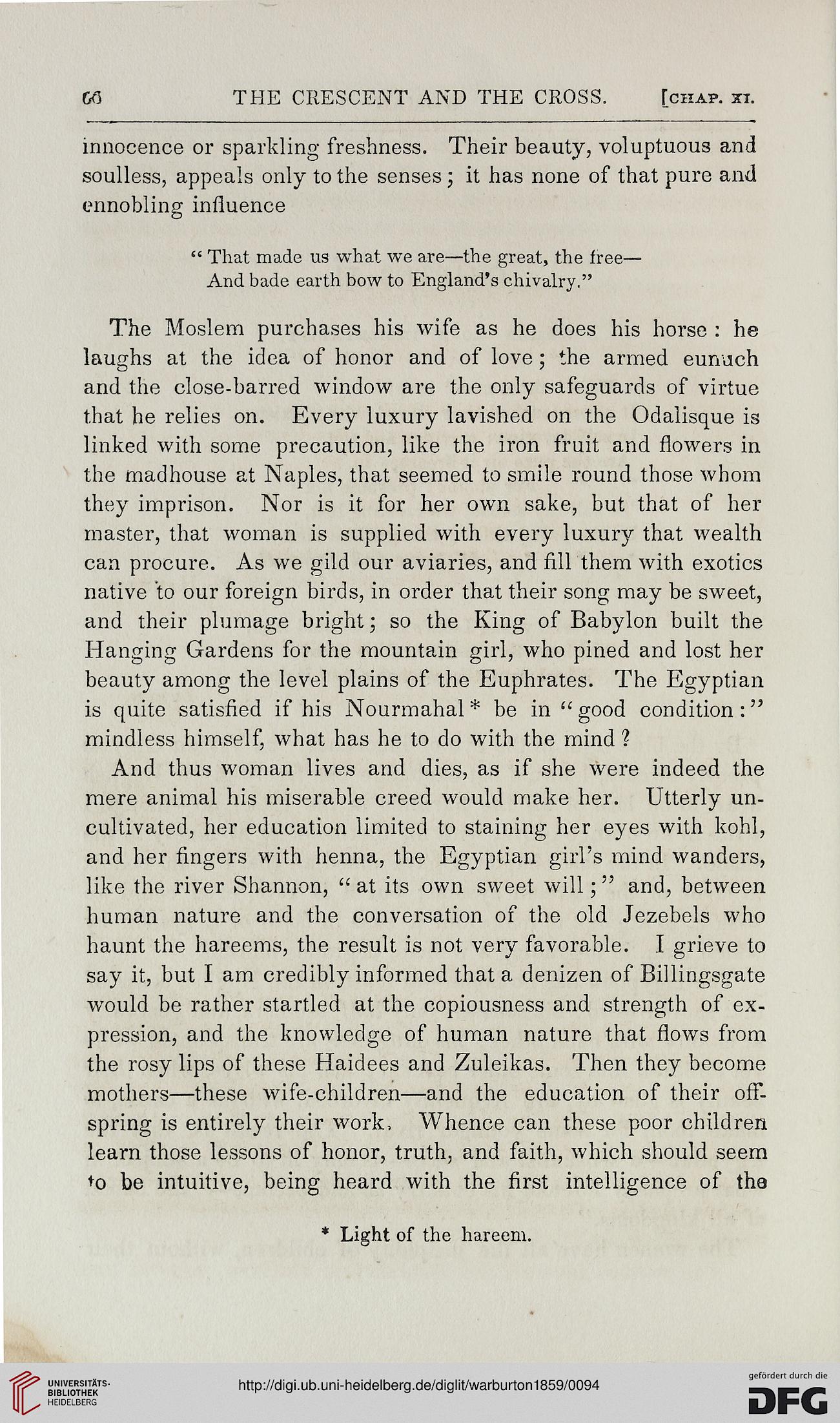THE CRESCENT AND THE CROSS.
[chap. xi.
innocence or sparkling freshness. Their beauty, voluptuous and
soulless, appeals only to the senses ; it has none of that pure and
ennobling influence
" That made us what we are—the great, the free—
And bade earth bow to England's chivalry."
The Moslem purchases his wife as he does his horse : he
laughs at the idea of honor and of love; the armed eunuch
and the close-barred window are the only safeguards of virtue
that he relies on. Every luxury lavished on the Odalisque is
linked with some precaution, like the iron fruit and flowers in
the madhouse at Naples, that seemed to smile round those whom
they imprison. Nor is it for her own sake, but that of her
master, that woman is supplied with every luxury that wealth
can procure. As we gild our aviaries, and fill them with exotics
native to our foreign birds, in order that their song may be sweet,
and their plumage bright; so the King of Babylon built the
Hanging Gardens for the mountain girl, who pined and lost her
beauty among the level plains of the Euphrates. The Egyptian
is quite satisfied if his Nourmahal* be in "good condition:"
mindless himself, what has he to do with the mind ?
And thus woman lives and dies, as if she were indeed the
mere animal his miserable creed would make her. Utterly un-
cultivated, her education limited to staining her eyes with kohl,
and her fingers with henna, the Egyptian girl's mind wanders,
like the river Shannon, " at its own sweet will ;" and, between
human nature and the conversation of the old Jezebels who
haunt the hareems, the result is not very favorable. I grieve to
say it, but I am credibly informed that a denizen of Billingsgate
would be rather startled at the copiousness and strength of ex-
pression, and the knowledge of human nature that flows from
the rosy lips of these Haidees and Zuleikas. Then they become
mothers—these wife-children—and the education of their off-
spring is entirely their work, Whence can these poor children
learn those lessons of honor, truth, and faith, which should seem
to be intuitive, being heard with the first intelligence of the
* Light of the hareem.
[chap. xi.
innocence or sparkling freshness. Their beauty, voluptuous and
soulless, appeals only to the senses ; it has none of that pure and
ennobling influence
" That made us what we are—the great, the free—
And bade earth bow to England's chivalry."
The Moslem purchases his wife as he does his horse : he
laughs at the idea of honor and of love; the armed eunuch
and the close-barred window are the only safeguards of virtue
that he relies on. Every luxury lavished on the Odalisque is
linked with some precaution, like the iron fruit and flowers in
the madhouse at Naples, that seemed to smile round those whom
they imprison. Nor is it for her own sake, but that of her
master, that woman is supplied with every luxury that wealth
can procure. As we gild our aviaries, and fill them with exotics
native to our foreign birds, in order that their song may be sweet,
and their plumage bright; so the King of Babylon built the
Hanging Gardens for the mountain girl, who pined and lost her
beauty among the level plains of the Euphrates. The Egyptian
is quite satisfied if his Nourmahal* be in "good condition:"
mindless himself, what has he to do with the mind ?
And thus woman lives and dies, as if she were indeed the
mere animal his miserable creed would make her. Utterly un-
cultivated, her education limited to staining her eyes with kohl,
and her fingers with henna, the Egyptian girl's mind wanders,
like the river Shannon, " at its own sweet will ;" and, between
human nature and the conversation of the old Jezebels who
haunt the hareems, the result is not very favorable. I grieve to
say it, but I am credibly informed that a denizen of Billingsgate
would be rather startled at the copiousness and strength of ex-
pression, and the knowledge of human nature that flows from
the rosy lips of these Haidees and Zuleikas. Then they become
mothers—these wife-children—and the education of their off-
spring is entirely their work, Whence can these poor children
learn those lessons of honor, truth, and faith, which should seem
to be intuitive, being heard with the first intelligence of the
* Light of the hareem.




